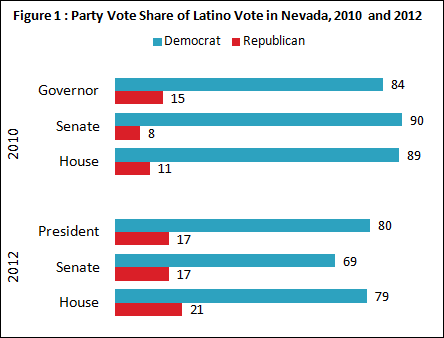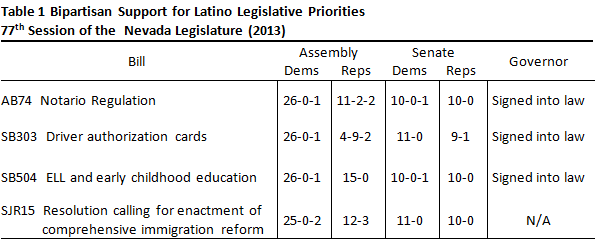As the GOP continues to struggle with its “Latino problem,” Republicans might look to Nevada for a constructive example of how some of their co-partisans are responding to the country’s changing political demography. Indeed, Nevada is very much a case study of how migration, urbanization, and generational replacement are rapidly reshaping the electorate with the end result being that the white share of the of the vote in Nevada has declined from 82% in 2000 to 67% in 2012.[1] By decades end, the Silver State will be majority-minority.

Certainly, Republicans have been able to win in Nevada in recent election cycles even as the state has delivered key contests for the Democrats. Some of these victories, however, had more to do with the quality of the Democratic candidates as opposed to any ground swell of support for the GOP.[2] Moreover and as Figure 1 makes clear, in none of these races did Republican candidates win many Latino votes or, for that matter, those of any of Nevada’s other fast growing demographic groups. Add to this the fact that Republicans have gone from a narrow voter registration advantage in 2000 to a deficit of 135,000 in 2012, long-term survival for Nevada Republicans demands that the party reposition itself.
Since last November there is ample evidence to suggest that such repositioning is well under way. Organizationally, in January, Nevada Republicans were the first state party to support comprehensive immigration reform including a pathway to citizenship. In announcing this shift, party officials noted that the party “has increasingly found itself in positions that do not meet the demographic realities of the State’s electorate.”
More recently, the party’s establishment wing moved to regain control of the party apparatus that had become so dysfunctional that during the 2012 election Mitt Romney’s campaign established a shadow organization to oversee his campaign in Nevada. In a closely contested vote, David McKeon (son of Buck McKeon who represents California’s 25th House district with a Latino voting age population of 32%), defeated the Ron Paul aligned incumbent, Cindy Lake, to take control of the Clark County (Las Vegas) Republican Party.
There also have been observable efforts among Nevada’s Republicans in Congress – Senator Dean Heller and Representatives Mark Amodei (NV-2) and Joe Heck (NV-3) – to reposition themselves particularity on immigration related issues. In terms of messaging, all references to “amnesty,” “these people,” and “anchor babies” have been replaced with the language of “respect” and “pragmatism,” and “inclusion.” All three have also now support immigration reform – in one form or another – that includes a pathway to citizenship.
Of the three, the transformation of Heller has been the most severe. Prior to 2013, he opposed the DREAM Act and DACA and supported Arizona’s SB1070. When he was in the House, Heller co-sponsored the Birthright Citizenship Act of 2009 (HR1868) and the Language Unity Act of 2007 (HR997). Fast-forwarding to his fall Senate campaign against Shelley Berkley, Heller was the rare Republican to match his Democratic opponent’s advertising on Spanish language outlets. After the election Heller openly advertised his transformation, which was nicely captured in a post-election Politico profile entitled “Dean Heller’s Extreme Makeover”. While Heller danced around the gun background check in the spring before ultimately voting no, he was one of 14 Republicans to vote for S744 in June.
Of Nevada’s two House Republicans, Amodei is best positioned to exert some influence on immigration legislation given his position, albeit quite junior, on the House Judiciary Committee. Amodei also represents a district with a demographic profile that is comparable to that of the average House Republican. Specifically, Nevada’s 2nd has a 74% white voting age population (VAP) and a small (16% VAP), but growing Latino constituency. Although President Obama won 48% of the 2nd district vote in 2008 and 45% in 2012, a Democrat has never held the district since its creation after the 1980 Census and the Democrats have stopped recruiting in the district, effectively giving Amodei a pass in 2014. Outside of a primary challenge by district resident Sharron Angle, it is unlikely that Amodei will be seriously challenged from within his party regardless of his immigration positioning owing to his long-standing ties to the northern Nevada power structure (he was president of the Nevada Mining Association while serving in the Nevada Legislature).
Nonetheless, during the summer recess, Amodei has been quite visible, holding a number of town hall meetings and making the rounds among northern Nevada news outlets. In these contexts, Amodei has said that while he would vote against S744, he does support many of its principles including a pathway to citizenship and the DREAM Act. He did, however, vote against funding for DACA in June.
In contrast to Amodei’s situation, Joe Heck has become the poster child for the cross-pressured Republican. Representing a suburban, swing district with growing Asian and Latino populations that was twice carried by Obama, Heck’s district has been identified by Latino Decisions as a Tier One target where the politics of immigration could be decisive in 2014. Heck too has been a visible presence in his district during the recess. Despite some heated exchanges with and among his constituents over immigration reform at various town hall meetings, he has managed to effectively navigate the difficult terrain that he inhabits. At these events, Heck, akin to Amodei, has stated that he does not support S744, but is in favor of immigration reform that includes a pathway to citizenship.
Still, Heck is very much at the mercy of forces beyond his control as he is likely to have little say in either the content or the timing of any immigration bills that the House GOP leadership may take up between now and next November. Further, Heck voted against funding for DACA, which has already been used by the opposition to demonstrate that he is out of step with his constituents. Adding to Heck’s woes, a Democratic challenger, Erin Bilbray, has already emerged and will be the primary beneficiary of the Democrats and allied groups efforts during the 2014 cycle in Nevada.
At the state level, the Republicans’ minority status in both chambers of the Nevada Legislature has spared the state the divisive legislative debates over immigration related legislation that have flared across the country in recent years. To be sure, Republicans in the Nevada statehouse have introduced a number of bills akin to those advanced in neighboring Arizona (SB1070 in 2010) and Utah (HB497 2011) in recent sessions. [3] However, all of these bills died in committee.
The main beneficiary of this, of course, has been Governor Brian Sandoval, who has not been forced to take positions on legislation that would likely either alienate some segment of his party’s base or the state’s fast growing Latino population. Instead, Sandoval was able to use the recent legislative session to overcome a rocky start with Nevada’s Latino community and claim credit for signing into law a number of Latino legislative priorities.[4]

Specifically and as detailed above in Table 1, the state’s Latino community lobbied heavily for four legislative priorities in 2013: increased regulation of notarios; driver’s authorization cards for undocumented immigrants; a resolution urging Congress to pass comprehensive immigration reform that includes a pathway to citizenship, and for the first time in Nevada’s history, state funding for English Language Learners (ELL).[5]
Aided in no small part by a strong showing at the first ever Latino Lobbying Day at the Nevada Legislature, all four bills garnered bipartisan support in both chambers. In the Senate, the only dissenting vote was a rural Republican who voted against driver’s authorization cards. In the Assembly, which has a handful of Tea Party type Republicans, there was more GOP opposition to the Latino agenda, particularly for driver’s authorization cards. Nonetheless, the legislative debate surrounding all of these bills was, for the most part, civil and as such, demonstrated the growing political clout of the state’s Latino community.
In sum, while Nevada is likely to maintain its swing state status in the near-term, the present trajectory of the state’s political demography does not bode well for the Republicans’ long-term prospects. Instead of denying this reality, which is more-or-less what the Nevada GOP did during the prior decade while the Democrats were making substantial efforts to engage and mobilize Latino and other minority voters, some Nevada Republicans have begun to take corrective steps to realign the party in a manner that is more consistent with the state’s demographics. While only time will tell if these efforts are too little too late, at least some Republicans in Nevada have realized that when you are in a deep hole, it is probably best to stop digging.
[1] Estimates come from the Census Bureau’s Current Population Survey (CPS), Voting and Registration Supplement for 2000 and 2012. The 2000 estimate has a 3.2% margin of error and the error margin for the 2012 estimate is 3.3%. The CPS estimates of the Latino share of the Nevada electorate are 7.02% (+/- 8.4%) in 2000 and 14.89% (+/-10.3%) for 2012.
[2] For instance, in the 2012 U.S. Senate race Democrat Shelley Berkley received 6.5% less of the vote than Barack Obama, while there was no difference in support between Republican Dean Heller and Mitt Romney. Most of the Obama voters who deserted Berkley rolled off, supported a minor party candidate, or cast a “none of the above” vote.
[3] During the 2011 and 2013 sessions of the Nevada Legislature, Republicans legislators introduced a number of bills (AB430 and SB380 in 20111 and AB104 in 2013) that sought to require Nevada law enforcement agencies to verify the immigration status of individuals taken into custody; obligate the Nevada Attorney General’s office to create a law enforcement agreement with the United States Attorney General to enforce federal immigration laws; and mandate that employers use E-Verify to verify employment eligibility, as well as legislation that would have denied public benefits to non-citizens and required proof of citizenship to register to vote (SB367 in 2013). None of these bills made it out of committee.
[4] During his 2010 campaign, Sandoval reversed himself in supporting driver’s license for undocumented immigrants and Arizona’s SB1070. Perhaps most damning, when asked in an Univision interview how he would feel if his children were stopped and asked for their paper’s “my children do not see themselves as Hispanics.” Sandoval then denied making the comment in a subsequent television interview.
[5] Despite an estimated 70,000 to 90,000 English Language Learners in Nevada (roughly 16% to 20% of all K-12 students in the state), prior the passage of SB504, the only ELL funding in Nevada came from the federal government. While the $50 million state appropriation is significant, it is a fraction of the estimated cost needed to provide early childhood education, full day kindergarten, and ELL support to all Nevada students who are in need of those services. As a consequence, less than 5% of the state’s public schools are receiving a share of these funds.
David F. Damore is a Senior Analyst at Latino Decisions and Associate Professor of Political Science at the University of Nevada, Las Vegas. He is also a Nonresident Fellow in the Brookings Institution’s Governance Studies Program, and a key vote advisor to Project Vote Smart.


